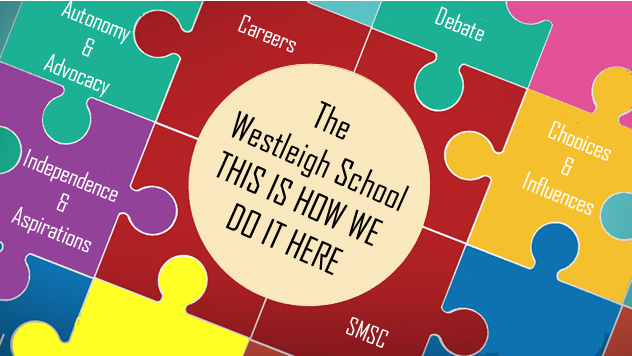Personal Development Curriculum Intent
The intent of our Personal Development curriculum, is to deliver a holistic ethos which pervades through everyday life, as well as a curriculum which is accessible to all. We endeavor to maximise the outcomes for every child so that they know more, remember more and understand more and by completing their programme of study for each year group. At The Westleigh School, Personal Development education is inclusive and enables all our children to become healthy, independent and responsible members of a society. It aims to help them understand how they are developing personally and socially, and tackles many of the moral, social and cultural issues that are part of growing up. We provide our children with opportunities for them to learn about British Values and appreciate what it means to be a member of a diverse society. Our children are encouraged to develop their sense of self-worth by playing a positive role in contributing to school life and the wider community.
At The Westleigh School, we seek to use Personal Development education to build, where appropriate, on the basic school curriculum and in statutory guidance on: drug education, financial education, sex and relationship education (SRE) and the importance of physical activity and diet for a healthy lifestyle. Our curriculum also incorporates religious beliefs, values and identity allowing our students to develop into well-rounded members of our community.
Implementation
Our programme takes a competencies-based approach to Personal Development Education through the curriculum. It groups competencies (including skills and attributes) under three headings: Independence and Aspirations; Autonomy and Advocacy; and Choices and Influences. Risk management and help-seeking strategies are addressed throughout, but in some units of work the programme highlights where these will be especially relevant or essential to the learning. Although the organisational starting point for this programme is developing competencies, this does not mean that building knowledge is not a central part of this model. The competencies are developed through the context of different topic areas, each with its own knowledge content. For example, ‘developing agency, the ability to manage influence and access support’ can be taught through the context of drugs and alcohol which would include the relevant factual knowledge. Religious content is evident throughout to match statutory guidance. Students do not complete data captures in personal development however progress is assessed throughout.
Impact
By the end of our students journey they will have developed the following skills :
- Students will demonstrate and apply the British Values of Democracy, Tolerance, Mutual respect, Rule of law and Liberty.
- Students will have an understanding about relationships, friendships and how to communicate with people
- Students will demonstrate a healthy outlook towards school which will help with attendance and behaviour.
- Students will build emotional resiliency and become responsible members of society
- Students will be on their journey preparing them for life and work in modern Britain.
- Students will be able to use their learning throughout the other subjects and general life experiences
We believe that Personal Development plays a vital part of secondary education and as well as discrete focused lessons, it is also embedded throughout the curriculum and school ethos. Personal Development is integral to the development of our student’s values in order for them to become a well-rounded citizen in a forever changing community.
Long Term Plans
"The only person you are destined to become is the person you decide to be" - Ralph Waldo Emerson
Examination Board
There is no exam in Personal Development.
.png)

.png)
